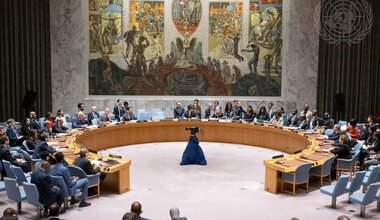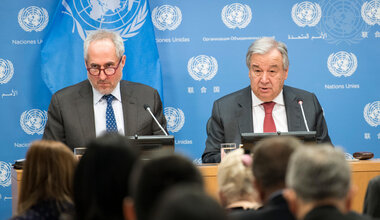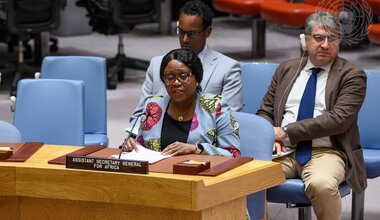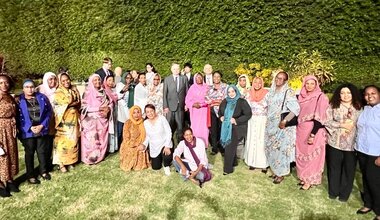Clementine Nkweta-Salami: Mounting humanitarian needs in Sudan as the conflict enters its third month
"The current conflict in Sudan is having a devastating consequence on civilians with hundreds killed and thousands injured", according to the Deputy Special Representative for Sudan at the United Nations Integrated Transition Assistance Mission in Sudan (UNITAMS), and the United Nations Resident Coordinator and Humanitarian Coordinator in Sudan (DSRSG/RC/HC), Ms. Clementine Nkweta-Salami.
Ms. Nkweta-Salami who was talking to Talal Al-Haj of Al-Arabiya channel, explained that since April 15, about 2.7 million people have fled their homes in search of safety, both inside and outside of the country.
This includes more than about 2.1 million, entirely displaced and more than about 560,000 who have crossed the border.
“They've either fled as refugees, or they were refugees in Sudan and are now returning to their countries of origin”.
According to UN agencies on the ground, people have crossed the borders into Egypt, Chad and South Sudan – the three countries that have received the vast majority of the refugees. Some have also crossed into Ethiopia.
The clashes between the Sudanese Armed Forces (SAF) and the Rapid Support Forces (RSF) have entered their third month. Despite the many ceasefires announced so far, reports of hostilities have continued, including in Khartoum, Kordofan and Darfur states.
Prior to the conflict, in Sudan itself, there were about 3.8 million people who were internally displaced, and, in the country, there were about 1.1 million refugees hosted by the government of Sudan, and many of these refugees were South Sudanese.
People need food, water but also protection
Since the outbreak of the conflict, there have been movements throughout the country, and what we see is significant displacement, both internally as well as externally.
In Sudan, there are 24.7 million people in need of humanitarian aid and assistance, and that represents about half of the total population of Sudan, according to the DSRSG/RC/HC Nkweta-Salami. “Half of this number, about 13 million, are children.”
In some parts of Sudan services have been discontinued; water is unavailable; electricity has been shut off.
“The people are in need of nutritional supplies, they are in need of water and they're also in need of protection”, stressed the DSRSG/RC/HC.
Humanitarian partners, including local organizations, continue to deliver aid, replenish stocks and provide services whenever and wherever possible.
The UN Central Emergency Relief Fund has allocated an additional $22 million and the Sudan Humanitarian Fund $40 million for urgent life-saving assistance to people affected by the crisis in the country. Additional funding continues to be urgently needed.
Respect of human rights is essential
Asked about the violation committed by both parties, Ms. Clementine Nkweta-Salami said that there have been constant and repeated appeals to both parties and those who are acting under their command, to respect human rights as well as international human rights law.
“We will continue to insist that the protection of civilians is upheld and that those who indeed are targeting civilians or those who are perpetrating rape, that these reports will be investigated”, asserted Nkweta-Salami pointing out that there are relevant bodies who will make sure that there is accountability.
To watch the DSRSG/RC/HC Nkweta-Salami full interview with Al-Arabiya, please click here.
 UN
UN






